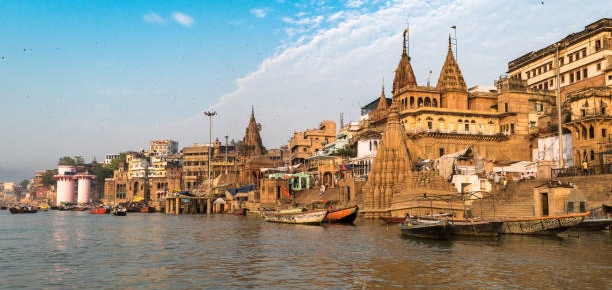Immersing in the Culture of Varanasi: Traditions That Define the City
Varanasi is often referred to as Kashi or Benares, is not just a city but a spiritual and cultural epitome of India. Situated on the banks of the holy river Ganges, Varanasi is a blend of ancient traditions, vibrant culture and timeless spirituality. This city is one of the oldest inhabited places in the world, offers a unique experience to every visitor, enveloping them in its profound cultural heritage and enduring traditions.

Historical and Cultural Heritage of Varanasi
Varanasi’s culture is deeply Twisted with its historical significance. The city is considered sacred in Hinduism, Jainism and Buddhism. It is believed that Lord Shiva, the destroyer in the Hindu Trinity founded this city. This rich spiritual history has contributed to the development of a diverse and complex cultural tapestry that is evident in the daily life and rituals of its inhabitants.
The Varanasi culture is a seamless blend of the old and the new. The ancient temples, the ghats on the banks of the Ganges, and the narrow winding lanes of the old city reflect a history that is thousands of years old. At the same time, the bustling markets, educational institutions like Banaras Hindu University, and vibrant arts scene show a city that is alive and evolving.
Spiritual and Religious Traditions
The Ghats of Varanasi
The ghats of Varanasi are perhaps the most iconic aspect of the city’s tradition. There are around 88 ghats, each with its own unique story and purpose. The Dashashwamedh Ghat, for example, is famous for its Ganga Aarti, a daily ritual that attracts thousands of devotees and tourists. The Manikarnika Ghat is one of the holiest places for Hindus, where cremations take place continuously, symbolizing the cycle of life and death.
Temples and Rituals
Varanasi is home to over 2,000 temples, including the famous Kashi Vishwanath Temple, dedicated to Lord Shiva. These temples are not just places of worship but are also centers of cultural and social activities. The daily rituals, festivals, and the ringing of temple bells are intrinsic parts of the Varanasi tradition.
The city also celebrates a plethora of festivals with great fervor. Diwali, Holi, Makar Sankranti, and Mahashivratri are some of the major festivals that showcase the vibrant Varanasi culture. During these festivals, the city comes alive with decorations, processions, and various cultural performances, providing a glimpse into the rich cultural fabric of the city.
Art, Music, and Literature
Varanasi has been a hub for art, music, and literature for centuries. The city has produced many renowned musicians, poets, and artists who have significantly contributed to Indian culture.
Classical Music and Dance
The Banaras Gharana of classical music is world-famous. This style of music, characterized by its unique presentation and emotional depth, has been nurtured in the lanes of Varanasi. Legends like Pandit Ravi Shankar and Ustad Bismillah Khan are among the many maestros who have roots in this city. The tradition of classical dance, particularly Kathak, is also prominent in Varanasi, with many institutions dedicated to teaching and preserving these art forms.
Literary Contributions
Varanasi has also been a literary center. It has been home to many eminent writers and poets like Premchand, Tulsi Das, and Bharatendu Harishchandra. The city’s literary culture is reflected in its numerous libraries, bookshops, and literary events, which continue to inspire new generations of writers.
Cuisine of Varanasi
The cuisine of Varanasi is as rich and diverse as its culture. It offers a variety of traditional dishes that are a treat for the senses.
Street Food Delights
The narrow streets of Varanasi are lined with food stalls offering delectable treats. Kachori Sabzi, Chena Dahi Vada, Tamatar Chaat, and Baati Chokha are some of the local favorites. The sweets of Varanasi, such as Malaiyo, Rasabgulla, and Jalebi, are renowned for their rich flavors and unique preparations.
Banarasi Paan
No discussion of Varanasi’s cuisine is complete without mentioning the Banarasi Paan. This betel leaf preparation, filled with areca nut and other condiments, is a cultural symbol and is enjoyed by locals and visitors alike.
Handicrafts and Textiles
Varanasi is famous for its exquisite handicrafts and textiles, particularly the Banarasi silk sarees. These sarees are known for their intricate designs, gold and silver brocade, and fine silk. The craftsmanship involved in making these sarees has been passed down through generations, and they are a must-have for any bridal trousseau in India.
The city is also known for its brassware, wooden toys, and other traditional crafts, which are popular among tourists and collectors.
Preservation of Culture and Traditions
In recent years, there has been a concerted effort to preserve and promote the culture and traditions of Varanasi. Various cultural festivals, heritage walks, and conservation projects are aimed at protecting the city’s rich heritage. Organizations and local bodies are working together to ensure that the unique cultural identity of Varanasi is preserved for future generations.
Conclusion
The culture of Varanasi is a mesmerizing blend of ancient traditions and contemporary life. Its spiritual ambiance, artistic legacy, culinary delights and scholarly pursuits make it a unique and captivating destination. Exploring Varanasi is like taking a journey through time, where every corner of the city tells a story and every ritual is a testament to its enduring cultural heritage.
